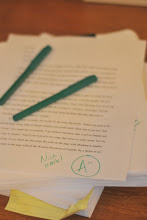This weekend, I attended and presented at my first conference for the American Educational Research Association. I was stunned at the scope of the conference. It lasts for nearly a week, with conference sessions running all day each day, with dozens of talks going on at any given moment in time. The printed program is a tome (over 400 pages), bigger than a telephone book for many towns across the country. The “participant index” lists over 12,500 names (that’s the number of people involved in presenting at the conference over its several days). The actual “program schedule” starts on page 67 and ends on page 366. With about 8 presentations listed on each page, that’s nearly 3,000 separate sessions with people talking about their research tied to education.
I knew that the conference was huge. I had no idea it was THIS huge. I had no idea there were this many people engaged in Educational Research (think of all the people who attend but don’t present, or the people who don’t go—there are certainly many many more researchers out there with their eyes toward education. I was completely overwhelmed by the scope and scale of it all.
And yet, at the same moment, we have a reform movement in education that is not actually achieving meaningful reform for our students. According to Diane Ravitch (I know F. Scott and I have been talking about her a lot lately, but her argument needs to be heard), the NAEP scores since NCLB has been in effect do not show, at all, that American students have actually been achieving higher scores due to NCLB. Yet, here we go with the same movement toward measure and punish reform and scapegoating teachers. As you know, our state is currently debating one such reform bill (SB191). The movement behind this notion of holding teachers accountable for the failings of a system far beyond their control is wickedly strong. I’m not sure we can stop it, and if we don’t—education in American may change forever.
How many of those 3,000 AERA conference sessions actually said anything about how to achieve actual, meaningful reform for our students? How many presenters made a plea to the audience to get involved, to speak up? (I did, and no one said anything to me about it—neither that they agreed with me nor that what I had said was inappropriate in that context). I feel like my dad here, a man who used to be a Roman Catholic priest and who now gives himself permission to leave a sermon in church if he gets mad that the priest isn’t talking about the big issue of society at the time—like when he and I went to church together the day after the gulf war started back in the early 90’s and the priest sad NOTHING about how the country had just gone to war. It’s like the research community maybe just keeps going along with their ever complex figures to capture conceptual frameworks, with their sophisticated statistical designs to cut across a data set in a myriad of ways, with their well-reasoned criticism of the shortcomings of schools, with their complex survey instruments to measure this or that.
I’m not writing off educational research here—please don’t get me wrong. I know some researchers who are doing very relevant and important work. I just don’t understand how, with so many thousands of researchers there are on the ground in this country, we could possibly be facing the current reform movement driven by policy makers and think tanks funded by huge corporations? Educators have not been asked to participate in the conversation, and now we face the consequences of decisions made without our counsel. It’s just not a time that researchers can ignore this in pursuit of the next idea.
--M. Shelley
Subscribe to:
Post Comments (Atom)


No comments:
Post a Comment